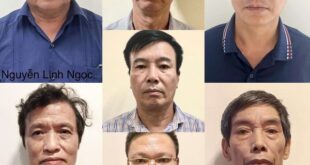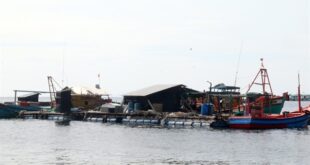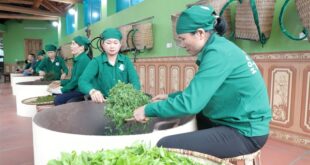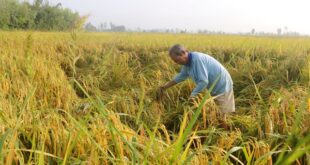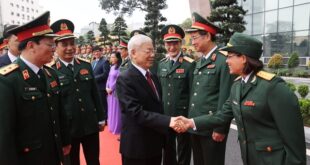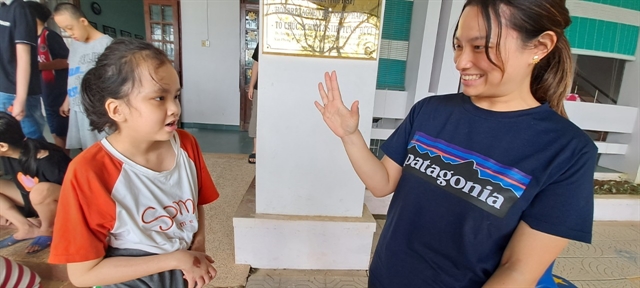 |
| Sai Koshikawa (right) guides a school girl learning how to count at the special Tương Lai School in Huế City. The school provides education for children with disabilities. — VNS Photos Công Thành |
Công Thành
THỪA THIÊN-HUẾ — Having worked at a school for disabled children in Yamanashi, Japan, Sai Koshikawa began a new adventure as a volunteer with the Japanese International Co-operation Agency (JICA), working in Việt Nam, a country she had not yet known.
Sai said she didn’t know much about Huế City before she came to work there.
The Japanese was taken to a special education centre, the Tương Lai School providing education for children with disabilities – where 57 children are given day-time education and rehabilitation exercise after leaving their families every morning.
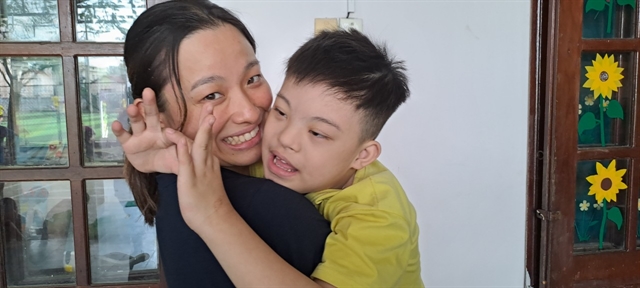 |
| Sai Koshikawa persuades a boy with a voice disorder to practise body language and count on his fingers at the school in Huế City. The Japanese volunteer has been working at the special school for children with disabilities for one year and four months. |
Sai said children here have different disabilities such as autism, voice disorder or limb disability that limit them studying at normal schools or in society.
“It’s a hard job for all teachers at the school, as one or two teachers look after a group of 10 or 12 kids. Meanwhile, in Japan, I and two other teachers cover a class, so we could support each other easily,” Sai said, adding that there were only nine teachers for a total of 57 children at the school.
“I find the job here tough because I do not speak Vietnamese so fluently with my little Vietnamese from a two-month course in Japan before travelling to Việt Nam. It took me more time to understand children with their disabilities and characters. However, love for children and job experiences conquer all. I overcome the first barriers to understand their psychological behaviours by playing and sharing emotions with the disabled children through daily activities.”
 |
| Children with disabilities in the special school in Huế receive support from foreign volunteers and Vietnamese teachers in rehabilitation practices and education. |
The Japanese volunteer said she helps children with art exercise, painting and colouring, easing their mental stress.
“Most of them find art a favourite session at school after outdoor playground exercise. I often work with some with autism and voice disorder. They could not speak a word clearly, and I support them on how to say a word exactly, or the right gesture as the other children do,” Sai explained.
“I tried to improve my Vietnamese language from colleagues and friends, even though the local Huế accent is a bit tough for me. I got closer to them (the children) to know what things they love to do or not, and what food or toys they prefer,” she shared.
Sai gradually fell in love with Huế, taking heritage trips and food tours after working time at weekends.
An Cựu Market is a favourite site she visits two days in a week, buying fresh food for cooking herself hot pot in Huế gastronomy. Huế-styled noodle with beef, rice with stir-fried mussel rice and steamed tapioca cake are the most common options for the Japanese teacher during her one-year and four months working and living in Huế City.
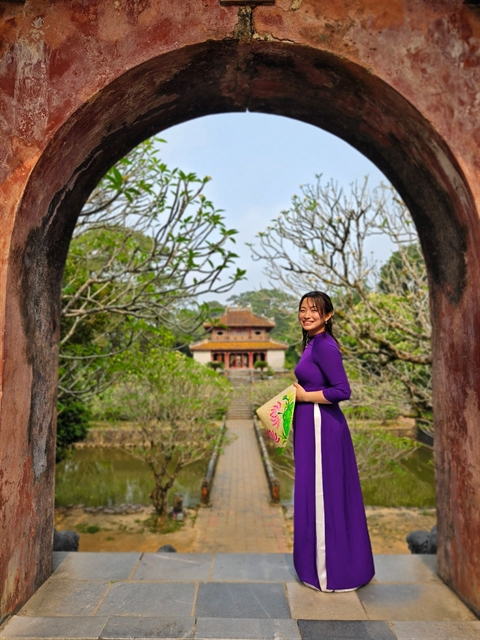 |
| Sai Koshikawa in typical purple Huế long dress fashion poses for a photo at a tourism site in Huế City. |
She said sweetened soup, or Chè Huế, a mixture soup of fruit, bean, lotus seeds and different ingredients makes a favourite snack on night walks with friends in the tourism hub.
Sai travels by bicycle from her flat to the school each day, as well as to destinations, markets and shopping for leisure.
The volunteer teacher has two traditional long dresses (áo dài), and one is in purple – the typical colour of Huế City – in festival fashion at school or party.
“My father paid a visit to Huế on my suggestion for his vacation. He also loves Huế architecture, pagodas, food and people. It seems that Huế has some similar designs and architecture to Japan.
Sai said she has been given positive support from Huế-born friends and colleagues during working and living in the city, and sometimes she also helps other teachers guide kids at playground or rehabilitation rooms.
“I’m so happy to hear kids calling my name whenever they need help from me. A boy with autism cannot speak clearly a word, but he could understand with my gesture and signals in little Vietnamese language. A girl with voice disorder could say my name and ask me for what they want, and they are so lovely when I teach them each day,” she said.
“I even wish to help them more because the children with disability have only few hours at school with us before their parents pick them up each day. They receive guidance and support from teachers in reviving their functions from birth defects,” she said.
Sai will be going back her old school in Yamanashi, but her time working at the Huế-based Tương Lai school will be an unforgettable memory for her.
“I love Huế for its peaceful landscape, helpful friends, spicy food and gentle manner of local people. I could find Huế like my home-town and family. I will remember Huế as a benchmark of my life, especially the children with disabilities in Huế.” — VNS
- Reduce Hair Loss with PURA D’OR Gold Label Shampoo
- Castor Oil Has Made a “Huge” Difference With Hair and Brow Growth
- Excessive hair loss in men: Signs of illness that cannot be subjective
- Dịch Vụ SEO Website ở Los Angeles, CA: đưa trang web doanh nghiệp bạn lên top Google
- Nails Salon Sierra Madre
 VnExpress News The News Gateway of Vietnam
VnExpress News The News Gateway of Vietnam
